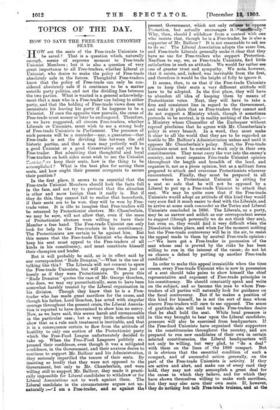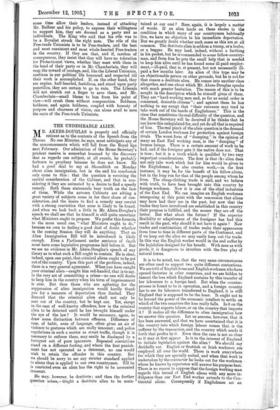• TOPICS OF THE DAY.
HOW TO SAVE THE FREE-TRADE UNIONIST SEATS.
HOW are the seats of the Free-trade Unionists to be saved ? That is a question which, naturally enough, seems of supreme moment to Free-trade Unionist Members ; but it is also a question of very great importance to all Free-traders, whether Liberal or Unionist, who desire to make the policy of Free-trade absolutely safe in the future. Thoughtful Free-traders know that the policy of Free-trade can only be con-, sidered absolutely safe if it continues to be a matter outside party politics, and not the dividing line between the two parties. What is wanted is a general acknowledg- ment that a man who is a Free-trader can belong to either party, and that the holding of Free-trade views does not necessitate his leaving his party if he happens to be a Unionist. If once the opposite view prevails, the cause of Free-trade must sooner or later be endangered. Therefore, as we have suggested, all sincere Free-traders, whether Liberals or Unionists, must wish to see a strong body of Free-trade Unionists in Parliament. The presence of such persons will he a reminder—nay, a guarantee—that Free-trade is not the dividing line between the old historic parties, and that a man may perfectly well be a good Unionist or a good Conservative and yet be a Free-trader. But admitting that thoughtful and loyal Free-traders on both sides must wish to see the Unionist r..ec-tre eJrs keep their seats, how is the thing to be accomplished ? What is the best plan for saving these seats, and how ought their present occupants to secure their position ?
In the first place, it seems to us essential that the Free-trade Unionist Members should look the facts full in the face, and not try to pretend that the situation is other and more benign than it really is. But if they do this, they cannot fail to realise that henceforth, if their seats are to be won, they will be won by Free- trade votes. It is idle to imagine that Free-traders will be returned by Protectionist electors. Mr. Chamberlain, we may be sure, will not allow that, even if the mass of Protectionist electors were willing to leave their Member a, free hand. The Free-trade Unionist can only look for help to the Free-traders in his constituency. The Protectionists are certain to be against him. But this means that the Free-trade Unionist who desires to keep his seat must appeal to the Free-traders of all kinds . in his constituency, and must constitute himself their champion and leader.
But it will probably be said, as is in effect said by our correspondent "Rude Donatus,"—What is the use of talking like this ? The Liberals will not consent to spare the Free-trade Unionists, but will oppose them just as keenly as if they were Protectionists. To prove this "Rude Donatus" quotes the case of Mr. George Goschen, who does, we may say parenthetically, seem to have been somewhat harshly treated by the Liberal organisation in his division. Though they know that he is a Free- trader who has made great sacrifices for the cause, and though his father, Lord Goschen, has acted with singular courage throughout the present crisis, the Liberal Associa- tion is reported to have determined to show him no mercy. Now, as we have said, this seems harsh and unreasonable in the particular case ; but a very little reflection will show that as a rule such treatment is inevitable, and that it is a consequence certain to flow from the attitude of hostility to only one section of the Protectionist party which the Free-Food League unfortunately decided to take up. When the Free-Food Leaguers publicly ex- pressed their confidence, even though it was a mitigated confidence, in the Government, and their anxious desire to continue to support Mr. Balfour and his Administration, they seriously imperilled the tenure of their seats. By insisting so loudly that they were not opposed to the Government, but only to Mr. Chamberlain, and were willing still to support Mr. Balfour, they made it practi- cally impossible for Liberal candidates to withdraw or for Liberal Associations not to work against them. The Liberal candidate in the circumstances argues not un- naturally I am a Free-trader, and so against the present Government, which not only refuses to oppose Protection, but actually encourages it "unofficially." Why, then, should I withdraw from a contest with one who insists that, though he is a Free-trader, he is also a supporter of Mr. Balfour? It is not reasonable to ask me to do so.' The Liberal Association adopts the same line, and Free-trade Liberals generally make it clear that they have no use for Free-traders who support Protection. Needless to say, we, as Free-trade Unionists, find little satisfaction in such an attitude. We would far rather see one of greater trust and sympathy. We note, however, that it exists, and, indeed, was inevitable from the first, and therefore it would be the height of folly to ignore it.
It seems, then, to us that if the Free-trade Unionists are to keep their seats a very different attitude will have to be adopted. In the first place, they will have to abandon all idea of keeping them by means of Protectionist votes. Next, they will have to take a firm and consistent line in regard to the Government, and make it plain that as Free-traders they cannot and do not support a Ministry which, though it sometimes pretends to be neutral, is in reality nothing of the kind,— a Ministry whose Chancellor of the Exchequer without reproof proclaims that he agrees with Mr. Chamberlain's policy in every branch. In a word, they must make it clear to all the world that they are to be regarded as hostile to Mr. Balfour's Administration unless and until it opposes Mr. Chamberlain's 'policy. Next, the Free-trade Unionists must not be content to work only in their own constituencies. They must carry the war into the enemy's country, and must organise Free-trade Unionist opinion throughout the length and breadth of the land, a,nd organise it, not as a pious opinion, but as a militant force prepared to attack and overcome Protectionists wherever• encountered. Finally, they must be prepared in all cases where a Protectionist Unionist is sitting for a seat so safe that he will not be opposed by a Liberal to put up a Free-trade Unionist to attack that seat. We may be quite sure that if the Free-trade Unionists would adopt an attitude of this kind they would very soon find it much easier to deal with the Liberals, and to arrive at some such concordat as the Tories and Liberal Unionists concluded in 1886. The Liberals, as a party, may be as narrow and selfish as our correspondent seems to suggest (though personally we do not think they are), but even so, they would find it very difficult when the Dissolution takes place, and when for the moment nothing but the Free-trade controversy will be in the air, to resist the appeal made to them by neutral Free-trade opinion : —" We have got a Free-trader in possession of the seat whose zeal is proved by the risks •he has been willing to run in the interest of the cause; do not let us chance a defeat by putting up another Free-trade candidate."
In order to make this appeal irresistible when the time comes, every Free-trade Unionist who is now in possession of a seat should take pains to show himself the chief representative and exponent of Free-trade principles in his constituency. He should constantly speak and write on the subject, and so become the man to whom Free- traders of all parties will naturally look for guidance on the fiscal controversy. But if he makes a position of this kind for himself, he is not the sort of man whom sincere Free-traders will care to see opposed. The sense of gratitude also will tend to make Free-traders desire that he shall hold the seat. While local pressure is in this way brought to bear upon the Liberal candidate, pressure will also be exercised from headquarters. If the Free-food Unionists have organised their supporters in the constituencies throughout the country, and are prepared to rim new candidates of their own in certain selected constituencies, the Liberal headquarters will not only be willing, but very glad, to "do a deal" with them on the lines of the 1886 compact. But it is obvious that the essential condition of such a compact, and of successful action generally, on the part of the Free-trade Unionists is activity. If they are active and alert, and make use of every card they hold, they may not only accomplish a great deal for the cause in which they believe, and for which they have shown themselves willing to make such sacrifices, but they may also save their own seats. If, however, they do nothing but talk Free-trade truisms, and at the same time allow their leaders, instead of attacking Mr. Balfour and. his policy, to express their willingness to support him, they are doomed as a party and as individuals. The King who said that his role was to be a Royalist struck the right note. The rOle of the Free-trade Unionists is to be Free-traders, and the best and most consistent and most whole-hearted Free-traders in the country. If they are that, and if, careless of consequences, they insist that they will have no toleration for Protectionist views, whether they meet with them in the head of their party or in Mr. Chamberlain, they will reap the reward of courage, and, like the Liberal Unionists, continue in our political life honoured and respected till their work is accomplished. If, on the other hand, they are supine, half-hearted, fastidious, and stand. upon party punctilios, they are certain to go to ruin. The Liberals will not stretch out a finger to save them, and Mr. Chamberlain—small blame to him from his point of view—will crush them without compunction. Boldness, boldness, and again boldness, coupled with honesty of purpose and clearness of vision, can alone avail to save the seats of the Free-trade Unionists.



























































 Previous page
Previous page